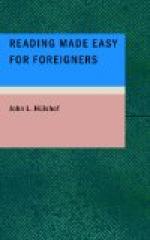The entire difference between education and non-education (as regards the merely intellectual part of it) consists in this accuracy. A well-educated gentleman may not know many languages, may not be able to speak any but his own, may have read very few books; but whatever word he pronounces, he pronounces rightly.
An ordinarily clever and sensible seaman will be able to make his way ashore at most ports; yet he has only to speak a sentence to be known for an illiterate person; so also the accent, or turn of expression of a single sentence, will at once mark a scholar.
Let the accent of words be watched, and closely; let their meaning be watched more closely still. A few words, well chosen, will do the work that a thousand cannot do, when every one of those few is acting properly, in the function of one another.
LESSON XLIII
HOW TO SELECT A BOY
A gentleman advertised for a boy, and nearly fifty applicants presented themselves to him. Out of the whole number he selected one and dismissed the rest.
“I should like to know,” said a friend, “on what ground you selected that boy, who had not a single recommendation?”
“You are mistaken,” said the gentleman; “he has a great many. He wiped his feet when he came in, and closed the door after him, showing that he was careful. He gave his seat instantly to that lame old man, showing that he was thoughtful. He took off his cap when he came in and answered my questions promptly, showing that he was gentlemanly.
“He picked up the book which I had purposely laid on the floor and replaced it on the table, and he waited quietly for his turn, instead of pushing and crowding; showing that he was honorable and orderly. When I talked to him I noticed that his clothes were brushed and his hair in order. When he wrote his name I noticed that his finger-nails were clean.
“Don’t you call those things letters of recommendation? I do; and I would give more for what I can tell about a boy by using my eyes ten minutes than for all the letters he can bring me.”
LESSON XLIV
SALT
Salt is an every-day article, so common that we rarely give it a thought; yet, like most common things, it is useful enough to be ranked among the necessaries of life. “I could not live without salt,” would sound to us exaggerated in the mouth of any one. Have you ever fancied that you could do without it?
How would meat taste without salt? Would not much of our vegetable food be insipid, if we neglected this common seasoning? And even the “daily bread” demands its share.
Where is this salt found, that we prize so little, yet need so much? The sea furnishes some, and salt-mines and salt-springs give the rest. Most of the salt used in this country is obtained from the water of certain springs. Among the richest of these springs are those at Salina, now a part of the city of Syracuse, New York. Forty gallons of water from these wells yield one bushel of salt.




